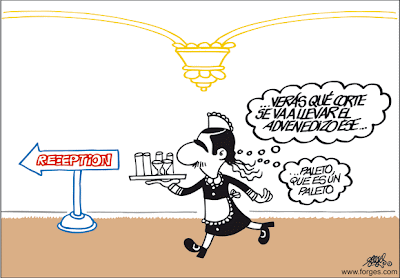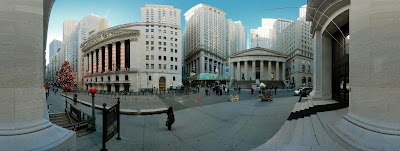Robert Fisk: a propósito de Gaza
Monday, 29 December 2008
We've got so used to the carnage of the Middle East that we don't care any more – providing we don't offend the Israelis. It's not clear how many of the Gaza dead are civilians, but the response of the Bush administration, not to mention the pusillanimous reaction of Gordon Brown, reaffirm for Arabs what they have known for decades: however they struggle against their antagonists, the West will take Israel's side. As usual, the bloodbath was the fault of the Arabs – who, as we all know, only understand force.
Ever since 1948, we've been hearing this balderdash from the Israelis – just as Arab nationalists and then Arab Islamists have been peddling their own lies: that the Zionist "death wagon" will be overthrown, that all Jerusalem will be "liberated". And always Mr Bush Snr or Mr Clinton or Mr Bush Jnr or Mr Blair or Mr Brown have called upon both sides to exercise "restraint" – as if the Palestinians and the Israelis both have F-18s and Merkava tanks and field artillery. Hamas's home-made rockets have killed just 20 Israelis in eight years, but a day-long blitz by Israeli aircraft that kills almost 300 Palestinians is just par for the course.
The blood-splattering has its own routine. Yes, Hamas provoked Israel's anger, just as Israel provoked Hamas's anger, which was provoked by Israel, which was provoked by Hamas, which ... See what I mean? Hamas fires rockets at Israel, Israel bombs Hamas, Hamas fires more rockets and Israel bombs again and ... Got it? And we demand security for Israel – rightly – but overlook this massive and utterly disproportionate slaughter by Israel. It was Madeleine Albright who once said that Israel was "under siege" – as if Palestinian tanks were in the streets of Tel Aviv.
By last night, the exchange rate stood at 296 Palestinians dead for one dead Israeli. Back in 2006, it was 10 Lebanese dead for one Israeli dead. This weekend was the most inflationary exchange rate in a single day since – the 1973 Middle East War? The 1967 Six Day War? The 1956 Suez War? The 1948 Independence/Nakba War? It's obscene, a gruesome game – which Ehud Barak, the Israeli Defence Minister, unconsciously admitted when he spoke this weekend to Fox TV. "Our intention is to totally change the rules of the game," Barak said.
Exactly. Only the "rules" of the game don't change. This is a further slippage on the Arab-Israeli exchanges, a percentage slide more awesome than Wall Street's crashing shares, though of not much interest in the US which – let us remember – made the F-18s and the Hellfire missiles which the Bush administration pleads with Israel to use sparingly.
Quite a lot of the dead this weekend appear to have been Hamas members, but what is it supposed to solve? Is Hamas going to say: "Wow, this blitz is awesome – we'd better recognise the state of Israel, fall in line with the Palestinian Authority, lay down our weapons and pray we are taken prisoner and locked up indefinitely and support a new American 'peace process' in the Middle East!" Is that what the Israelis and the Americans and Gordon Brown think Hamas is going to do?
Yes, let's remember Hamas's cynicism, the cynicism of all armed Islamist groups. Their need for Muslim martyrs is as crucial to them as Israel's need to create them. The lesson Israel thinks it is teaching – come to heel or we will crush you – is not the lesson Hamas is learning. Hamas needs violence to emphasise the oppression of the Palestinians – and relies on Israel to provide it. A few rockets into Israel and Israel obliges.
Not a whimper from Tony Blair, the peace envoy to the Middle East who's never been to Gaza in his current incarnation. Not a bloody word.
We hear the usual Israeli line. General Yaakov Amidror, the former head of the Israeli army's "research and assessment division" announced that "no country in the world would allow its citizens to be made the target of rocket attacks without taking vigorous steps to defend them". Quite so. But when the IRA were firing mortars over the border into Northern Ireland, when their guerrillas were crossing from the Republic to attack police stations and Protestants, did Britain unleash the RAF on the Irish Republic? Did the RAF bomb churches and tankers and police stations and zap 300 civilians to teach the Irish a lesson? No, it did not. Because the world would have seen it as criminal behaviour. We didn't want to lower ourselves to the IRA's level.
Yes, Israel deserves security. But these bloodbaths will not bring it. Not since 1948 have air raids protected Israel. Israel has bombed Lebanon thousands of times since 1975 and not one has eliminated "terrorism". So what was the reaction last night? The Israelis threaten ground attacks. Hamas waits for another battle. Our Western politicians crouch in their funk holes. And somewhere to the east – in a cave? a basement? on a mountainside? – a well-known man in a turban smiles.
Para otra versión del asunto: http://www.elpais.com/articulo/opinion/agonia/Gaza/trampa/Israel/elpepiopi/20081230elpepiopi_11/Tes?print=1







































